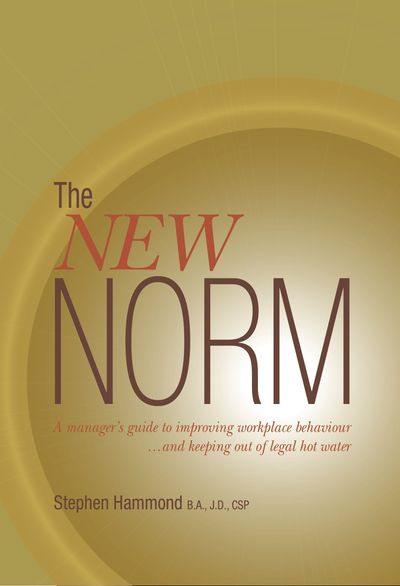Chapter thirty five
THE NEW NORM does the right thing…in the end
There are so many rights and obligations, sometimes it’s obvious to me that employers just don’t realize all their legal requirements. And when someone makes a formal complaint that can end up in a formal process, everyone digs in their heels. I mean everyone. Therefore it’s so refreshing when we hear that even after a confrontation, the person who is clearly in the wrong owns up to it and makes things better.
There are many barriers for persons with disabilities. One barrier comes up in the news often: persons with disabilities being denied access to restaurants (in particular) when they have their guide dog with them. While there’s no legal excuse for it, I understand why it happens all the time: ignorance.
Many restaurant owners do their best to keep their heads above water. According to an American study, sixty percent of restaurants fail in the first year, with eighty percent gone within five years. I’m sure the numbers are similar in Canada. So when a new restaurateur sees a person coming into their establishment with an animal, some of them must freak, thinking about health regulations as well as losing customers who don’t want to be eating with a dog!
The law is clear that they must allow in guide dogs with guide dog owners, but not every restaurant owner is aware of it. Of course, ignorance of the law is no excuse, and it’s very frustrating for persons with guide dogs. But how many guide-dog owners are going to make the effort of contacting the media or filing a human rights complaint? Very few.
In 2015, a rather touching news story caught my attention. In Scarborough, Ontario,
Ikki Sushi restaurant owner Bob Huang refused service to Karoline Bourdeau and her husband as long as her guide dog Potter was with them. You could see Huang on camera stating emphatically to the Global News reporter why he had refused them service. As a result, he faced a human rights complaint, and charges under Ontario’s Blind Persons Rights Act.
Six months later, the same news crew returned to Huang’s Scarborough restaurant to film him personally apologizing to Bourdeau and explaining that he wasn’t aware of his responsibilities under the law. Not only did his apology seem quite sincere, but he also pledged to volunteer with the Lions Foundation of Canada Dog Guides.
A cynic might think Huang’s actions came only from the threat of a formal human rights complaint and possible fines under the Blind Persons Rights Act. And perhaps there’s truth to that – we don’t know unless we get inside Huang’s head. However, since human rights legislation is meant to be remedial, not punitive, the remedy here turned out to be great. Bourdeau dropped her complaint and now thinks of Huang as an “ambassador” for other restaurant owners to learn and uphold the laws to support persons with disabilities.
I can’t get over how many cases I’ve read where the facts are so strongly against (for example) an employer, that I wonder why that employer would bother going through a hearing that they are so clearly likely to lose, and worse, it becomes public information.
There are a variety of reasons why a person won’t settle, but the one I see often is people feeling a need to dig in their heels. They either don’t seek out good advice, or they ignore anyone telling them they don’t have much of a chance. So as things proceed, the person feels increasingly aggrieved, prompting them to fight to the very end.
It’s a big person who can say, “I was wrong.” Or as the saying goes: “I thought I was wrong once, but I was mistaken.” I still laugh when I think of my mother saying to me, “It must be wonderful to always be so right all the time.”
Mostly she said it lightly, but she was making a point – I’m a person who feels passionately about certain things, and I find it tough to back down. So I know why people dig in their heels. The point is, I’ve learned to back off (most times) and try to think clearly, and it appears that Bob Huang did the same thing.
If you want your employees or colleagues to know that communication is the key and you can make amends before things go to far, you might be interested in taking my Respectful Workplace online course where I stress informal resolutions and proper communication to address workplace discrimination, including for persons with disabilities.
The OLD NORM
- digs in his heels, even if he’s dead wrong.
- refuses to make an apology “on principle,” although no one really knows what that principle is.
- isn’t willing to make things right even after she has been proven wrong, insisting on believing the process was stacked against her.
- will stick to his version of the facts, even after a legitimate process has discredited those so-called facts.
The NEW NORM
- may be stubborn or have stubborn qualities, but she’s not stupid.
- if she still thinks she’s right, will keep an open mind and can be swayed by listening to the facts and/or reason.
- will apologize when he comes to his senses and realizes he’s in the wrong.
- wants to make things right and will go the extra mile to make sure others know he has learned from his mistakes.
Suggestions for the New Norm:
01
Not everything is personal. Not everything is about the world doing something against us! No one is correct all the time and sometimes we’re in the wrong. When someone criticizes something we’ve done, we often think we are being called bad, stupid or ignorant. It could just be that our behaviour was wrong and that’s okay. Unless it’s a tragedy, we can learn from it and move on. We shouldn’t take things so personally.
02
Be careful about being adamant about everything. I was like that. I’m not a gambler (at all) but one time I was so adamant about something that I bet $100. Needless to say, I lost the bet. It was a good lesson; I learned from it because I had to part with money. If I know something to be absolutely true because I DO know it, then I can go to the wall to protect my side. If not 100 percent sure, then not only do I not take a bet, but I actually listen more attentively. I am persuaded with good logic and sound facts.
03
Take a step back. If you remove yourself from the emotions of an issue, you might see it from a different perspective…one other than your own.
This chapter lets you know that even after being on opposite sides of a human rights complaint, people can do the right thing and apologize when it’s clear someone was in the wrong.
If you want more understanding on the rights and obligations in the workplace for human rights issues, consider reading
Chapter 15: The New Norm helps employees work with difficult family responsibilities.
Purchase a copy of The New Norm, or if you think all your supervisors and managers, could learn many valuable lessons about creating a respectful workplace, free of harassment, bullying and discrimination, you can get volume discounts.
What one reader has to say about Stephen’s book, The New Norm
“When I got up early this morning and headed for my computer here at home, I told myself, ‘Just skim read a few sections of Stephen’s book and get a note back to him.’ I couldn’t do that, Stephen. I read it all – every word. You have taken too long to write this book – Employees and Employers in Canada need to read this.
Stephen will capture your attention in highlighting up to date and interesting headlines which we all have an opportunity to learn from. If you believe you can simply skim read this book, think again! The mesmerizing case studies will leave you yearning to learn the conclusion as any great author should do for their readers. Sincere attention to the messages here can only result in best practices within Canadian workplaces.”
Melinda Heidsma
Executive Director, AiMHi, Prince George Association for Community Living

Respectful Workplace Online Training Course
If you, your employees or your managers want more information,
sign up for my new online training course:
The Respectful Workplace in Canada.
With 10 modules of useful, relevant and current information,
this course can help everyone at your workplace.
This may be the best online harassment training your people will get.
Stephen Hammond is a lawyer turned speaker and consultant in the field of harassment, sexual harassment, bullying and discrimination at work.
The New Norm is Stephen’s third book.
Here’s more information about Stephen.





